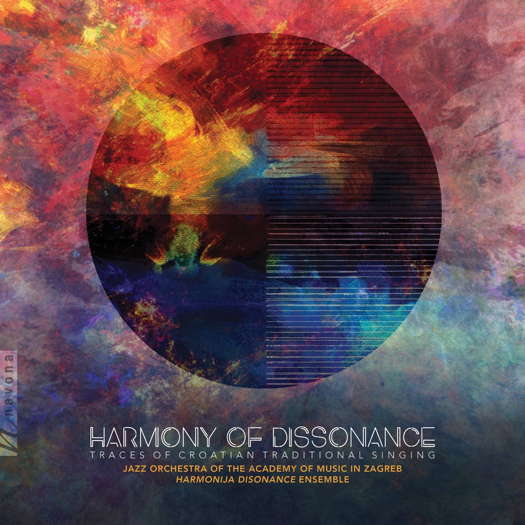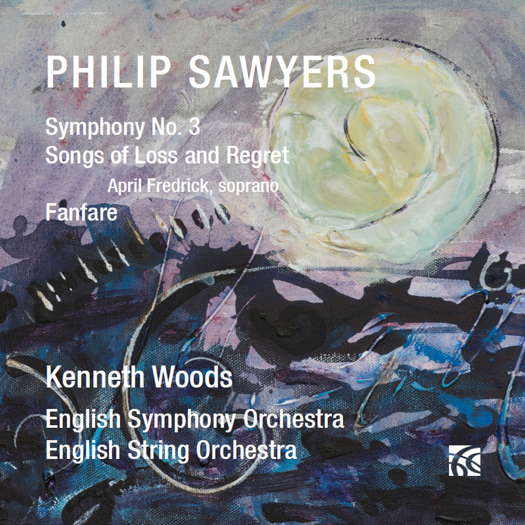- Isaac Albéniz
- Sofia Propişcean
- Tallis
- Timothy Constable
- John Caldwell
- Tuscany
- Cleo Lane
- University of Pennsylvania

A Double Identity
PAUL SARCICH listens to
traditional Croatian song plus
jazz-rock inflected arrangements
'The recording of the women is very clear and detailed, the big band has some balance problems ...'
Future music historians may well dub the early 21st century as 'The Age of Crossover'. So many styles get melded in both popular and 'serious' music these days that boundaries become blurred, sometimes to the point of total fluidity, which annoys purists but delights those of a more embracing viewpoint. Do not be put off by the main title Harmony of Dissonance either - this is 'dissonance' only compared with the diatonic basis of western European folk music - to modern ears very little of this will seem seriously dissonant.
Despite the subtitle Traces of Croatian Tradition Singing, there are more than traces of traditional Croatian song here, in fact the greater number of tracks are given over to the Harmonija Disonance Ensemble - nine women who perform traditional material in traditional style, albeit in arrangements by Joško Ćaleta, an ethnomusicologist and expert in the music of the Croatian coastal and hinterland areas. The Ensemble's sound and style will be familiar to anyone who has heard stylistically similar Balkan music such as Bulgarian women's singing.
Sitting against their material are jazz-rock inflected takes on traditional songs, arranged by Zoran Ščekić and performed by the Jazz Orchestra of the Academy of Music in Zagreb, essentially a big band with added violins, flute, piccolo and clarinet. The whole enterprise thus has academic credentials backing it up, as disparate as the two groups at first seem. Oddly though, the two groups only perform together on four tracks, which seems a bit of a wasted opportunity, given the 31 that comprise the album.
So the first requirement for the listener is to have some liking for the sounds of traditional Balkan music as sung in the distinctive microtonally-inflected manner of women's choirs from the area. It's not all open-throated singing and raw fifths though: three tracks, Procvitala kitica fiole, Šenice bilice and Ovamo dojdi, sokole, display a soft-voiced, lyrical approach that is wholly attractive. At the other extreme lies the full-on party atmosphere of Ko bi reka, complete with shouts, whoops and tambourines. In between lies a wealth of Croatian song expertly sung by the Ensemble, which will cause no problem to fans of this sort of music.
Whether they can make the transition to jazz versions, or whether jazz mavens can make the backward journey, must remain an open question. Ščekić indulges in a lot of quirky writing, nothing that would disturb those up with trends in modern jazz, and he does stay true to the spirit of the original material, but sometimes there is an air of trying a bit too hard. Many of the tracks are quite short, but on a couple of the longer ones, like Na Neretvu misečina pala and Zapjevaj mi, jaranice moja, where the writing stretches out to embrace extended solos and build a larger-scale jazz framework, I found a more satisfying listen in terms of the development of ideas. Having said that, Ščekić is a very experienced arranger and knows how to exploit the forces he has.
Perhaps the best 'in' to this disc are the two songs that are presented back-to-back with the women singing first, followed by the jazz take. These are Zapjevaj mi, jaranice moja and Dođi, dragi, kad čobana ima, and listening to these in pairs will summarise the approach taken throughout the album.
Listen — trad Croatian, arr Joško Ćaleta: Zapjevaj mi, jaranice moja
(track 25, 0:00-0:38) © 2019 Navona Records LLC :
Listen — trad Croatian, arr Zoran Ščekić: 'Zapjevaj mi, jaranice moja'
(track 26, 0:00-0:51) © 2019 Navona Records LLC :
Listen — trad Croatian, arr Joško Ćaleta: Dođi, dragi, kad čobana ima
(track 29, 0:00-0:58) © 2019 Navona Records LLC :
Listen — trad Croatian, arr Zoran Ščekić: 'Dođi, dragi, kad čobana ima'
(track 30, 3:41-4:36) © 2019 Navona Records LLC :
The recording of the women is very clear and detailed, the big band has some balance problems, the violins and high winds often sounding back and rather weak against the band; the drums are quite forward and sometimes dominate too much. This is not to denigrate the excellent work of drummer Šimun Matišić though. The band is obviously a student one, but well-trained and turns in some fine work in both ensembles and solos.
All in all, an album with a double identity, but successfully crossing two ensembles which might not a first sight seem to have any kind of fit in the offing. Solid musicianship all round is what does it.
Copyright © 5 March 2019
Paul Sarcich,
London UK

CD INFORMATION: HARMONY OF DISSONANCE
FURTHER ARTICLES ABOUT CROATIA
FURTHER INFORMATION: NAVONA RECORDS




